Montagu Love
Harry Montagu Love (15 March 1877 – 17 May 1943)[1] was an English screen, stage and vaudeville actor.
Montagu Love | |
|---|---|
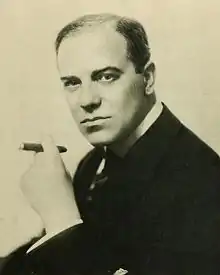 | |
| Born | 15 March 1877 Portsmouth, Hampshire, England, United Kingdom |
| Died | 17 May 1943 (aged 66) |
| Other names | Harry Montagu Love |
| Occupation | Actor |
| Years active | 1914–1943 |
| Spouse(s) | Marjorie Hollis Love (1929-1943) (his death) Gertrude Stainer Love (1906-1928) (divorced) |
Early years
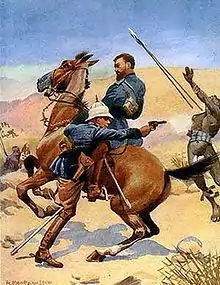
Born in Portsmouth, Hampshire, Love was the son of Harry Love (b. 1852) and Fanny Louisa Love, née Poad (b. 1856); his father was listed as accountant on the 1881 English Census.
Career
Educated in Great Britain, Love began his career as an artist, with his first important job as an illustrator for The Illustrated Daily News in London.[2]
Love's acting debut came with an American company in a production in the Isle of Wight.[2] He honed basic stage talents in London, and in 1913 sailed to Canada and crossed the border into the United States in November with a road-company production of Cyril Maude's Grumpy. His Broadway debut occurred in The Second in Command (1913).[1]
He was typically cast in heartless villain roles. In the 1920s, he played with Rudolph Valentino in The Son of the Sheik, opposite John Barrymore in Don Juan, and appeared with Lillian Gish in 1928's The Wind. He also portrayed 'Colonel Ibbetson' in Forever (1921), the silent film version of Peter Ibbetson. Love was one of the more successful villains in silent films.
One of Love's first sound films was the part-talkie The Mysterious Island co-starring Lionel Barrymore. In 1937, he played Henry VIII in the first talking film version of Mark Twain's The Prince and the Pauper, with Errol Flynn. Love played the bigoted Bishop of the Black Canons in The Adventures of Robin Hood, also starring Flynn. However, he also played gruff authoritarian figures, such as Monsieur Cavaignac, who, contrary to history, demands the resignation of those responsible for the Dreyfus cover-up, in The Life of Emile Zola (1937), as well as Don Alejandro de la Vega, whose son appears to be a fop but is actually Zorro, in the 1940 version of The Mark of Zorro, starring Tyrone Power.
In 1941, he played a doctor in Shining Victory. In 1939's Gunga Din, Montagu Love reads the final stanza of Rudyard Kipling's original poem over the body of the slain Din.
Love's last film to be released, Devotion, was released three years after his death aged 63 in 1943. He was interred at Chapel of the Pines Crematory. His last acting performance was in Wings Over the Pacific (1943).
Personal life
Love was married to actress Marjorie Hollis.[3]
Death
On May 17, 1943, Love died in Beverly Hills, California at age 66.[1]
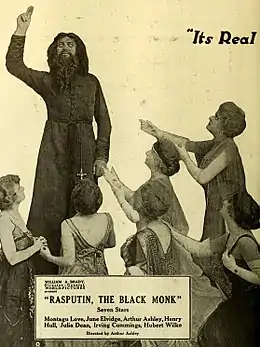
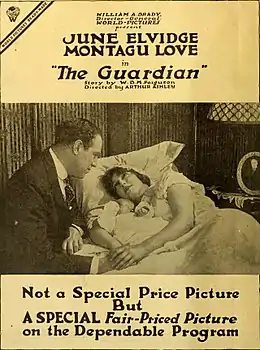
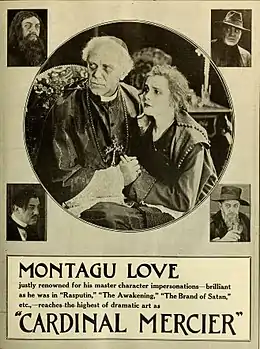
Filmography
- The Suicide Club (1914) as Prince Florizel (film debut)
- Hearts in Exile (1915) as Count Nicolai
- The Face in the Moonlight (1915) as Ambrose
- Sunday (1915) as Henry Brinthorpe
- A Royal Family (1915) as Crown Prince of Kurland
- The Greater Will (1915) as Stuart Watson
- The Devil's Toy (1916) as Wilfred Barsley
- A Woman's Way (1916) as Oliver Whitney
- Husband and Wife (1916) as Patrick Alliston
- Friday the 13th (1916) as Count Varneloff
- The Gilded Cage (1916) as Baron Stefano
- The Hidden Scar (1916) as Henry Dalton
- The Scarlet Oath (1916) as Nicholas Savaroff
- Bought and Paid For (1916) as Robert Stafford
- The Men She Married (1916) as Jerry Trainer
- The Challenge (1916) as Quarrier
- The Dancer's Peril (1917) as Michael Pavloff
- Forget Me Not (1917) as Gabriel Barrat/Benedetto Barrato
- Yankee Pluck (1917) as Baron Wootchi
- The Brand of Satan (1917) as Jacques Cordet
- The Guardian (1917) as James Rokeby
- Rasputin, The Black Monk (1917) as Gregory Novik/Rasputin
- The Dormant Power (1917) as Maurice Maxwell
- The Awakening (1917) as Jacques Revilly
- The Volunteer (1917) as Himself
- Broken Ties (1918) as John Fleming
- The Cross Bearer (1918) as Cardinal Mercier
- Vengeance (1918) as Lorin Cuddlestone/John Cuddlestone
- Stolen Orders' (1918) as John Le Page
- The Cabaret (1918) as Jaffrey Darrel
- To Him That Hath (1918) as David Aldrich
- The Grouch (1918) as Donald Graham
- The Hand Invisible (1919) as Rodney Graham
- The Quickening Flame (1919) as John Steele
- Three Green Eyes (1919) as Allen Granat
- Through the Toils (1919) as Noel Graham/Lewis Moffat
- A Broadway Saint (1919) as Dick Vernon
- The Steel King (1919) as John Blake
- Man's Plaything (1920) as Pelton Vab Teel
- The Rough Neck (1919) as John Masters
- The World and His Wife (1920) as Don Julian
- The Riddle: Woman (1920) as Larz Olrik
- The Wrong Woman (1920) as William Marshall
- The Place of the Honeymoons (1920) as Edward Courtlandt
- Shams of Society (1921) as Herbert Porter
- The Case of Becky (1921) as Prof. Balzamo
- Forever (1921) as Colonel Ibbetson
- Love's Redemption (1921) as Frederick Kent
- The Beauty Shop (1922) as Maldonado
- What's Wrong with the Women? (1922) as Arthur Belden
- The Secrets of Paris (1922) as The Schoolmaster
- The Darling of the Rich (1922) as Peyton Martin
- The Leopardess (1923) as Scott Quaigg
- Little Old New York (1923) as Minor Role
- The Eternal City (1923) as Charles Minghelli
- Restless Wives (1924) as Hugo Cady
- Roulette (1924) as Dan Carrington
- Week End Husbands (1924) as Thomas Mowry
- A Son of the Sahara (1924) as Sultan Cassim Ammeh/Colonel Barbier
- Love of Women (1924) as Bronson Gibbs
- Who's Cheating? (1924) as Harrison Fields
- Sinners in Heaven (1924) as Native Chief
- The Ancient Highway (1925) as Ivan Hurd
- The Desert's Price (1925) as Jim Martin
- The Mad Marriage (1925) as Unknown role
- Hands Up! (1926) as Capt. Edward Logan
- Brooding Eyes (1926) as Pat Callaghan
- Out of the Storm (1926) as Timothy Keith
- The Social Highwayman (1926) as Ducket Nelson
- Son of the Sheik (1926) as Ghabah
- Don Juan (1926) as Count Giano Donati
- The Silent Lover (1926) as Ben Achmed
- One Hour of Love (1927) as J.W. McKay
- The Night of Love (1927) as Duke de la Garda
- The King of Kings (1927) as Roman Centurion
- The Tender Hour (1927) as Gramd Duke Sergei
- Rose of the Golden West (1927) as Gen. Vallero
- Jesse James (1927) as Frederick Mimms
- Good Time Charley (1927) as John Hartwell
- The Haunted Ship (1927) as Captain Simon Gant
- The Noose (1928) as Buck Gordon
- The Devil's Skipper (1928) as First Mate
- The Hawk's Nest (1928) as Dan Daugherty
- The Wind (1928) as Wirt Roddy
- The Haunted House (1928) as Mad Doctor
- Synthetic Sin (1929) as Brandy Mulane
- The Last Warning (1929) as Arthur McHugh
- The Divine Lady (1929) as Captain Hardy
- Bulldog Drummond (1929) as Peterson
- Midstream (1929) as Dr. Nelson
- Charming Sinners (1929) as George Whitley
- Her Private Life (1929) as Sir Bruce Haden
- Silks and Saddles (1929) as Walter Sinclair
- A Most Immoral Lady (1929) as John Williams
- The Mysterious Island (1929) as Baron Falon
- Love Comes Along (1930) as Sangredo
- Double Cross Roads (1930) as Gene Dyke
- A Notorious Affair (1930) as Sir Thomas Hanley
- Back Pay (1930) as Charles Wheeler
- Inside the Lines (1930) as Governor of Gibraltar
- Outward Bound (1930) as Mr. Lingley
- Reno (1930) as Alexander W. Brett
- Kismet (1930) as The Jailer
- The Cat Creeps (1930) as Hendricks
- The Lion and the Lamb (1931) as Professor Tottie
- Alexander Hamilton (1931) as Thomas Jefferson
- Love Bound (1932) as John Randolph
- Stowaway (1932) as Groder
- Vanity Fair (1932) as Marquis of Steyne
- The Silver Lining (1932) as Michael Moore
- The Riding Tornado (1932) as Walt Corson
- The Midnight Lady (1932) as Harvey Austin
- Out of Singapore (1932) as Scar Murray - Boatswain
- The Mystic Hour (1933) as Captain James alias The Fox
- His Double Life (1933) as Duncan Farrel
- Menace (1934) as Police Inspector
- Limehouse Blues (1934) as Pug Talbot
- Clive of India (1935) as Gov. Pigot
- The Crusades (1935) as The Blacksmith
- Hi, Gaucho! (1935) as Hillario Bolario
- The Man Who Broke the Bank at Monte Carlo (1935) as Director
- Sutter's Gold (1936) as Capt. Kettleson
- The Country Doctor (1936) as Sir Basil Crawford
- Frankie and Johnny (1936) as Colonel Brand (uncredited)
- Champagne Charlie (1936) as Ivan Suchine
- The White Angel (1936) as Mr. Bullock, Under Secretary of War
- Sing, Baby, Sing (1936) as Robert Wilson
- Reunion (1936) as Sir Basil Crawford
- Lloyd's of London (1936) as Hawkins
- One in a Million (1936) as Ratoffsky - alias of Sir Frederick Brooks, Olympic Secretary
- The Prince and the Pauper (1937) as Henry VIII
- Parnell (1937) as Gladstone
- London by Night (1937) as Sir Arthur Herrick
- The Life of Emile Zola (1937) as M. Cavaignac
- The Prisoner of Zenda (1937) as Detchard
- A Damsel in Distress (1937) as Lord Marshmorton
- Adventure's End (1937) as Capt. Abner Drew
- Tovarich (1937) as M. Courtois
- The Buccaneer (1938) as Admiral Cockburn
- The Adventures of Robin Hood (1938) as Bishop of the Black Canons
- Kidnapped (1938) as Colonel Whitehead
- The Fighting Devil Dogs (1938, Serial) as General White
- Professor Beware (1938) as Professor Schmutz (uncredited)
- If I Were King (1938) as General Dudon
- Gunga Din (1939) as Colonel Weed
- Juarez (1939) as Jose de Montares
- Sons of Liberty (1939, Short) as George Washington
- The Man in the Iron Mask (1939) as Spanish Ambassador
- Rulers of the Sea (1939) as Malcolm Grant
- We Are Not Alone (1939) as Major Millman
- The Lone Wolf Strikes (1940) as Emil Gorlick
- Dr. Ehrlich's Magic Bullet (1940) as Prof. Hartmann
- Northwest Passage (1940) as Wiseman Clagett
- The Sea Hawk (1940) as King Phillip II
- All This, and Heaven Too (1940) as Marechal Sebastiani
- Private Affairs (1940) as Noble Bullerton
- A Dispatch from Reuter's (1940) as John Delane
- North West Mounted Police (1940) as Inspector Cabot
- The Mark of Zorro (1940) as Don Alejandro Vega
- The Son of Monte Cristo (1940) as Prime Minister Baron Von Neuhoff
- Hudson's Bay (1941) as Governor D'Argenson
- The Devil and Miss Jones (1941) as Harrison
- Shining Victory (1941) as Dr. Blake
- Lady for a Night (1942) as Judge
- The Remarkable Andrew (1942) as General George Washington
- The Voice of Terror (1942) as General Jerome Lawford
- Tennessee Johnson (1942) as Chief Justice Chase
- Forever and a Day (1943) as Sir John Bunn
- The Constant Nymph (1943) as Albert Sanger
- Wings Over the Pacific (1943) as Jim Butler
- Holy Matrimony (1943) as Judge (uncredited)
- Devotion (1946) as Rev. Brontë (final role)
References
- "Montagu Love". Internet Broadway Database. The Broadway League. Archived from the original on 9 September 2019. Retrieved 9 September 2019.
- "Montagu Love refused to be a minister". The San Francisco Examiner. California, San Francisco. 29 September 1921. p. 13. Retrieved 9 September 2019 – via Newspapers.com.
- "Obituary: Montagu Love". Daily News. New York, New York City. Associated Press. 19 May 1943. p. B 34. Retrieved 9 September 2019 – via Newspapers.com.
External links
| Wikimedia Commons has media related to Montagu Love. |
- Montagu Love at IMDb
- Silent Ladies & Gents
- Montagu Love at the Internet Broadway Database

- Montagu Love at Find a Grave
- Montagu Love at Virtual History